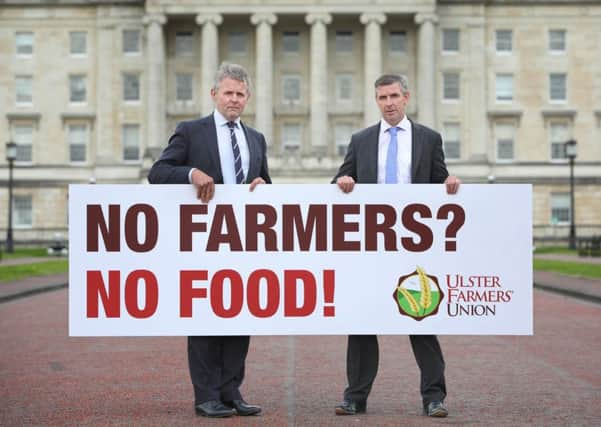Whitehall needs to find £200m a year for our embattled farmers as Scots eye our CAP payments


That’s according to a leading farm union and producer association, who have warned MLAs that farmers across Northern Ireland need certainty after what was a disastrous 2015 in terms of food prices.
Between 2014 and 2015, total farm income here fell from £312 million to £183 million, for example.
Advertisement
Hide AdAdvertisement
Hide AdBut during a briefing of the Agriculture Committee at Stormont just before the Assembly went into recess, leading figures in the Northern Ireland Agricultural Producers Association (NIAPA) and the Ulster Farmers’ Union, warned that our farms will have to be heavily subvented if the European Common Agricultural Policy (CAP) payments are ended as they make up 87 per cent of local farmers’ incomes.
Michael Clarke of the NIAPA said: “We wish to ensure the long-term future of our industry and security for the next generation who will inherit farm businesses. From a farm income perspective, we are acutely aware of the impact of farm subsidies on businesses.
“Take 2015: £183 million was made from active farming compared with £236 million from subsidies.
“Eighty-seven per cent of the average farm business income came from direct payments from the CAP.
Advertisement
Hide AdAdvertisement
Hide Ad“We are in the unfortunate position of having to depend on subsidies to maintain our industry as farm gate prices bear no relation to the cost of production. Farmers would much prefer to receive a realistic price for their produce than depend on subsidies. Given our dependence, however, after the Brexit vote, we must have concerns about the long-term future of farm-support measures.”
Barclay Bell of the UFU said: “The number-one item on the agenda for any of our farmers is the continuation of direct support. How that will look is, I suppose, anybody’s guess, as is what the pot of money will be. However, when you consider that, last year, 87 per cent of farm income was made up of direct support, it is critical that we all try to get the best possible deal from Whitehall and our fair share of the money for Northern Ireland.
“When we consider how many jobs are linked to the agrifood industry, it is critical that we as unions and you as politicians fight our corner very hard to ensure that we get a fair share of the money, whatever it might be.
“Another critical issue, we feel, is the markets, whether it be the home market trying to get produce into the EU or new markets being opened up. We think that there have been blockages previously at Whitehall in opening up new markets, so that needs to be pushed as well.”
Advertisement
Hide AdAdvertisement
Hide AdThe Committee Chair, Sinn Féin MLA Linda Dillon, suggested that previous direct support from the EU “has been to our advantage here in the North, as against Scotland, England and Wales.”
Mr Bell said he was concerned Scotland will be covetous of a greater share of the CAP payments we currently enjoy.
“The number one challenge is the direct support and the question of whether we will have that pot of money. We will probably see Scotland thinking that they should be getting a bit of our money. There are concerns. It is not all that we are sailing into the New World,” said Mr Bell.